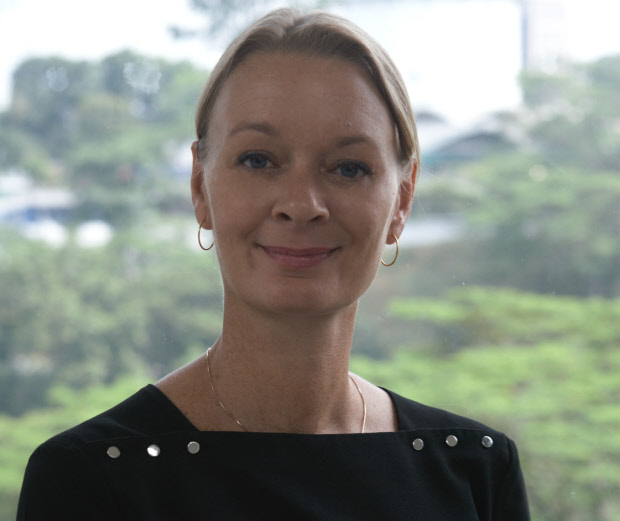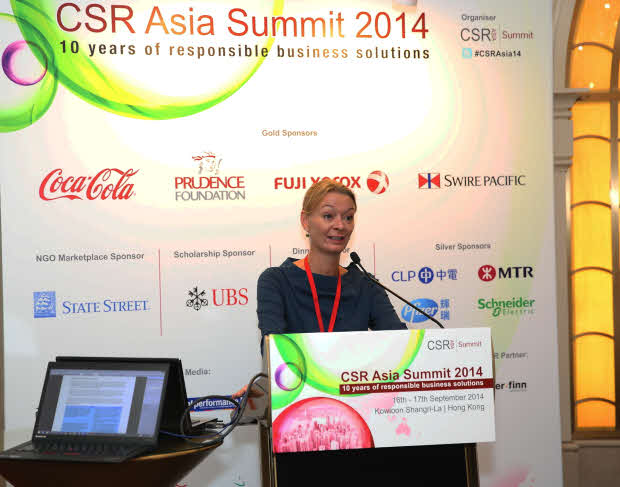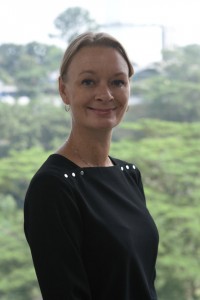Rikke Jarvad Netterstrøm, MD at Helikonia Advisory in Malaysia, knows a great deal about corporate social responsibility issues and is a very experienced person to turn to for expertise within sustainability strategy, stakeholder engagement and management of issues.
Prior to starting the S-E Asia consultancy in 2008 she was responsible for environmental and social issues for two of the world’s sustainability leaders – The Body Shop International plc and Novozymes A/S, preparing strategies for over 50 markets globally.
She has also worked extensively throughout Europe, Asia and the Americas as an investment analyst and a public affairs consultant; providing advisory services to multinational companies within a range of sectors, including consumer goods, agrichemicals and financial institutions.
Rikke holds an MSc in International Business from Copenhagen Business School and postgraduate qualifications from Thammasat University, Thailand.

“I’m an economist, but specialised in developing economics; how international companies impact on newly developed countries,” she explains.
The Dane’s main focus today is on board-level engagement to promote responsible business practices and disclosure at major Asian and international companies. Helikonia has been part of the CSR Asia network (which operates in Bangkok, Hong Kong, Kuala Lumpur, Tokyo, Singapore and Sydney) since 2008 with Rikke on its Board.
Their focus on Asian companies explains why she came over here in the first place: She played a role in the creation of the Roundtable on Sustainable Palm Oil as an Executive Board member, and has served as Interim Secretary General of the organisation.
“Through my work at the Body Shop I got involved in the palm oil industry and really trying to work with the industry, who I felt were doing a lot of good things, but were not good at engaging with the international stakeholders. They didn’t really understand what the market in Europe needed; they didn’t know how to talk to their customers, or the international NGOs.”
“I felt they could really use some help, so that’s why I decided to start up Helikonia. And after about a year I got in touch with CSR Asia, the biggest providers of sustainability services in Asia, who were very keen on having an office in Malaysia. And I decided to join forces with them.”
Training directors in Asian companies
CSR Asia are leading advisors on strategic sustainability services.
“As a group we offer advisory services, with a lot of training, which we have done for thousands of directors of the Hong Kong stock exchange. In Malaysia we also work with the Malaysian stock exchange Bursa Malaysia and here we probably reached about 500 company directors with training for so far.”
A lot of in-house board training is also performed for specific companies that need more internal training in confidential discussions where we facilitate such discussions on the sustainability aspect and non-financial risk management.
“Most of our business is still Asian, though we are starting to get more European businesses coming to us.”
Their services are indeed available for any western company opening up shop, sourcing or manufacturing from or within any country over in Asia. Though there are two definite observations in this respect: the focus being on medium to large companies as clients, and Asian companies being the focal point.
Western companies new to Asia can certainly take a first contact with Rikke and her team.
“We see ourselves as a mission-driven business, so if you come to Malaysia and you want to get some good ideas what you should be looking out for and not our door is always open,” invites Rikke.
“A lot of European and American companies coming here think they’ve got everything under control. And then some turn to us a few years later when they have run into trouble.”
“I suppose a lot of European companies think they’re already perfect or they’re already at a much higher level than the local ones, and they don’t necessarily always understand the specific risks that they have here,” she adds.
There are plenty of pitfalls.
Rikke goes on to mention child labour, bonded labour and biodiversity challenges as being different issues in different countries – that European companies often don’t see as such. And political corruption issues are very different; sector and country-based.
“I think our strength both here at Helikonia in Malaysia and broadly in CSR Asia is that we understand the vast differences within the region.”
She mentions as a client example a very large foreign technology supplier that has struggled to implement its international labour standards in Malaysia, because of only using foreign workers locally.
“It’s a very tricky situation to make sure you comply with your own policies here, because of the legal framework for foreign workers. Companies come unprepared for these kinds of things.”

Ways to learn about CSR
CSR Asia also offers two main gateways for learning, the first being a network of companies in a membership group called CSR Asia Strategic Partners.
“That brings together companies from all over Asia and allows you to build a network with our companies where you can talk, confidentially, about your various challenges. I think that is very useful because, first it gives you access to our experts that you can always phone up and get some informal advice, second you also get a network of others within your industry. And I find that the most important thing for our members is that they feel there always somebody that they can rely on if they run into any kind of question or trouble. They can then find a company in either the same country or industry that they can connect with and share good ideas.”
“I am very happy with this network, because when I first started working within sustainability I learned a lot more from talking to other companies and being part of such member groups than I did from my consultants. I am a consultant and I shouldn’t say this but often you learn so much from your peers!”
Second, company representatives can attend the annual CSR Asia Summit – in 2015 to be hosted in Kuala Lumpur on October 7-8. This summit gathers some 600 delegates from 30 countries to cutting-edge discussions on solutions and challenges related to CSR and sustainability.
“We always say to people who are new to Asia, and new to CSR: spend two days there and at least you’ll get an overview of what the issues are that one needs to be aware of. Who are the resources, experts and the best companies that I can perhaps benchmark myself against? Which consultants are out there, if that’s what I need? Which NGOs are out there if I need such contacts locally?”
“It’s in my mind is by far the most interesting and forward-looking conference – it’s not just people talking about how wonderful they are, it’s actually a forum to discuss real problems and real solutions, so probably one of the best opportunities to really get your head around what’s happening in Asia,” she says.
Stakeholder engagement in the DNA
As for companies connecting with NGOs (Non Government Organisations) this can play a key role in connecting with the local communities (who are on their own much more empowered these days via the Internet.)
“When we’re talking about company engagement it is with communities and NGOs who have skills and knowledge. That involves learning how to talk to NGOs who can perhaps help in finding solutions. Companies are good at innovations and making money, they’re not experts in how to engage with communities or on biodiversity. So they need to create these partnerships, whether it is with universities or NGOs or others, and they need to understand what people think about their business.”
This helps companies to allocate resources and guide initiatives to be most effective and establish better relations with key players affecting their business.
Helikonia states that stakeholder engagement should be in the DNA of every company, but advocates the use of third-party facilitators on a regular basis to ensure that stakeholders can express their views confidentially.
“We always say you cannot do CSR without Stakeholder engagement. If you don’t understand what your stakeholders expect from you then it is not social responsibility; it’s just what you want!”
“We use stakeholder engagement to make sure that whatever you do is much more strategic than just the low-hanging fruit.”
Their advisory services to the palm oil sector on sustainability reporting apply to all other sectors and clients, and include enhancing transparency and accountability; assisting companies in creating future-proof disclosure and strategies – helping to manage risk and create opportunities for sustainable growth.
“We focus on identifying what priority areas should be for each respective company, mapping out where they can actually generate business opportunities out of being sustainable. Some of the companies that we work with have really created a brand for themselves as being a sustainable option, which gives them preferential treatment with their customers.”
These companies can over the years prove that they are worthy of their customers’ trust by having good relationships with the international NGOs and a proven track-record in having no conflicts and those sort of things, and the policies in place that their market/customers require.
“Certain industries are much more active than others; those very closely tied to the export sectors, who supply to big European brands tend to be much more robust about what they do. So the palm oil sector in Indonesia and Malaysia is miles ahead of any of the other sectors, because they’ve been under attack for the last ten years in European media. Their customers are very concerned about performance, on that they report really well, and they perform really well. Some of the manufacturing industries, such as the IT sector, are also really stepping up their game.”

A real mind-set change
“There’s a huge amount of development in Asia. That’s part of why I came over here; when things start moving they move really fast. You see stock exchanges and regulators really coming on board with these types of issues. It’s fun to be part of a real mind-set change,” thinks Rikke.
The stock exchanges are really playing a significant role in driving CSR forward.
“Bursa Malaysia really took the early lead, as the first in the region to require companies to report on CSR within their annual report. Then the Hong Kong stock exchange came on board with guidance for companies and the Thai stock exchange is developing requirements for reporting which are even stronger than we are having in Malaysia so there’s a bit of the race to the top within the local stock exchanges.”
The next step in Malaysia was the recent launch of the Environmental, Social and Governance (ESG) Index, developed in collaboration with FTSE as part of the globally benchmarked FTSE4Good Index Series.
“The trick [with the reporting] is to do it in a way so it doesn’t just become a tick box. It’s very easy for companies to tend do a lot of write-ups – so it becomes what we call greenwashing. The ESG index is interesting as it sets indicators that companies will have to report on. So they have to actually report on their carbon emissions or their health and safety, which makes it trickier to just write nice and fluffy stories, as you have to actually prove your commitments.”
This development makes Helikonia/CSR Asia very busy.
“But we also see a lot of companies who want us to do PR, as a nice campaign for them to be able to say that they are green.”
Those companies going down that path don’t become her clients. But it’s clearly a trend out there, as feel-good factor for companies, believes Rikke
“Unless they really have something very well documented to shout about, we always advice companies against these kinds of campaigns. I think you’re actually putting your company at risk if you are out there saying you are green, but you haven’t got a robust strategy behind it. And I would say that this represents a big proportion of claims in the Asian market. It’s total nonsense!”

